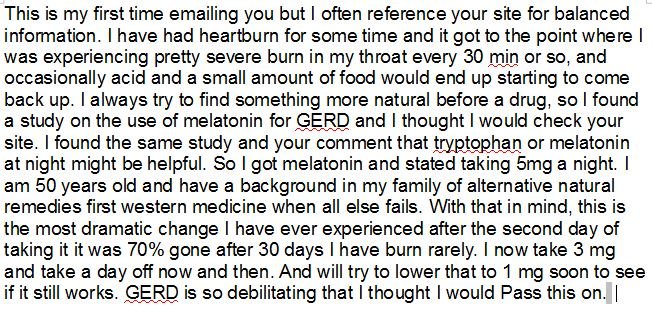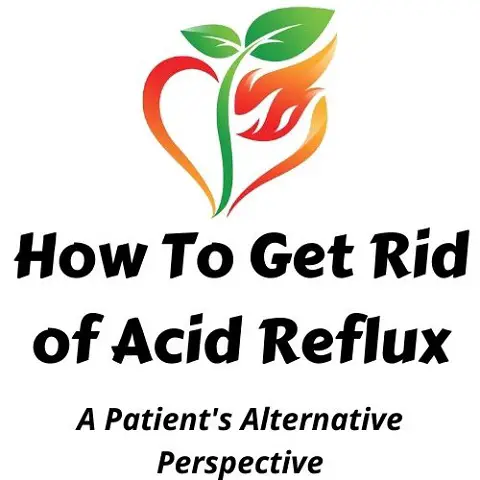Any links on this page that lead to products on Amazon and other companies may be affiliate links and we earn a commission if you make a qualifying purchase. Thanks in advance for your support!
You know how it is – you’ve just flown in after a 12 hour flight and your bodyclock is still programmed to the timezone you left 12 hours ago. It seems that a lot of people now reach for a pill which helps to re-balance your normal rhythms – Melatonin. However, it is now also a useful weapon in the fight against acid reflux.
Melatonin is a hormone that is produced by the pineal gland. It plays a crucial role in the regulation of the sleeping and waking cycle. Melatonin works by triggering chemical receptors in the brain to encourage sleep. It is probably best known as a sleep aid, and in particular a supplement to help overcome jetlag.
Melatonin can be found naturally in foods, such as tomatoes, olives, rice, barley, strawberries, cherries, and cow’s milk. A warm glass of milk before bed is a common home remedy for insomnia.
But can melatonin help with reflux? read on below…
Night time reflux? Read how to avoid it here
Night time reflux? Read how to avoid it here
Melatonin also has known inhibitory effects on gastric acid secretion and nitric oxide biosynthesis. This means that it inhibits the production of hydrochloric acid and pepsin (as do PPI’s and acid blockers like Ranitidine (Zantac)), and interrupts the natural processes which result in the relaxation of the lower esophageal sphincter (LES) – all good for cutting down on acid reflux.
A study conducted in 2006 compared a treatment consisting of a combination of melatonin, l-tryptophan, vitamin B6, folic acid, vitamin B12, methionine and betaine, with 20 mg omeprazole (a PPI – a common drug used to control acid production). It concluded that all patients in the melatonin group experienced complete regression in symptoms of acid reflux after 40 days of treatment, compared to the omeprazole group, of which only 66% experienced complete regression.
Further discussion on the effectiveness of melatonin in treating gerd can be found at reference 1, below.
One endorsement found on http://www.raysahelian.com/gerddiet.html : “I was trying everything with minimum success until I tried melatonin and it really did the trick!”
Another testimonial from the same site follows:

Another aspect is to what extent your lifestyle factors contribute to lower melatonin levels – eg exposure to screens and lighting late at night – computer / TV / room lighting. Modifying these could help.
You may wish to experiment with the dosage; some people starting off with a high dose (5mg +) have reported initial sickness, and one commentator suggested beginning with 0.5 mg and building up. According to WebMD, most adults should start with .2 milligrams; if that isn’t enough, you can raise your dose slowly (up to 5 milligrams, if necessary).
It is important to check with your physician before taking melatonin in case it may interact with other medicines, or if you may be allergic to it. For some people there may be side effects. For example, some people who take melatonin feel nauseous or drowsy; others have reported headaches. Others have said they feel depressed or like they have a hangover. However you feel with it, don’t drive or operate machinery if you don’t know how melatonin will affect you or if you feel drowsy, no matter the time of day.
You should also be extra careful if you take the following medication, as melatonin can interact with them. Always check with your doctor first:
- blood thinners
- anti-seizure medication
- diabetes medication
- birth control pills
- blood pressure drugs
- immune-suppressing drugs.
Also, as melatonin is a hormone, taking any supplemental hormone may disrupt natural regulatory mechanisms of that hormone. This can create dependence over time and disrupt the circadian rhythm, which is crucial not only to sleep, but to overall health.
You can get either natural melatonin, or synthetic. According to WebMD, most supplements on the market have melatonin that’s made in a laboratory. Natural melatonin, made from the pineal gland of animals, can be contaminated with a virus, so be sure to check the label to know what you’re buying.
Ask your doctor or pharmacist which brand they recommend, as it has been shown that over two-thirds of melatonin supplements have more or less of the hormone than the amount listed.
However, according to WebMD, Doctors don’t know much about the long-term use of melatonin in adults. If you choose to use it, think of it as a temporary fix and not a permanent solution.
And what about its use by children? Some studies suggest it’s most likely OK to use in children, especially in the short term, but there’s not enough research to know for sure.
One good thing about melatonin is that it doesn’t look as if it’s addictive.
In the US, one of the best selling Melatonin supplements can be found here on Amazon.
In the UK, Melatonin is only available on prescription, but it can be found online at evitamins.
References: 1

Leave a Reply